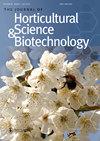Influence of propagation temperature, photosynthetic photon flux density, auxin treatment and cutting position on root formation, axillary bud growth and shoot development in Schlumbergera ‘Russian Dancer’
IF 2.1
4区 农林科学
Q2 HORTICULTURE
Journal of Horticultural Science & Biotechnology
Pub Date : 2005-01-01
DOI:10.1080/14620316.2005.11511933
引用次数: 18
Abstract
Summary The effects of propagation soil temperature and photosynthetic photon flux density (PPFD), indole-3-butyric acid (IBA) concentration, and cutting position on root formation, axillary bud growth, and further growth were investigated in Schlumbergera ‘Russian Dancer’. Temperatures between 21.3ºC and 24.7ºC were optimal for root formation, whereas increasing temperature promoted axillary bud growth (onset of new phylloclade growth). At temperatures below 24.7ºC, root formation and axillary bud growth occurred more or less simultaneously, whereas at higher temperatures axillary bud growth occurred before roots were visible. Temperature also affected the number of phylloclades on the second and third levels of stem segments produced after propagation. On increasing PPFD from 46 to 72 µmol m–2 s–1 during propagation, time to axillary bud growth was reduced by 15%, and more phylloclades were produced at high PPFD combined with high temperature. Rooting ability and axillary bud growth were affected by cutting position on the stock plants, indicating the presence of topophysis in Schlumbergera. Time to visible roots and number of new phylloclades decreased basipetally with the original position of the cutting by approximately 25%, whereas time to axillary bud growth increased basipetally by 30%. Survival of cuttings receiving IBA at 10–5–10–3 M was superior. IBA at 10–3 M resulted in the shortest time to visible rooting. At increasing IBA concentration, time to axillary bud growth gradually increased and fewer phylloclades were produced. Concentrations of 10–2 and 10–1 M IBA had negative effects on all measured characters. The results are discussed in relation to possible roles of auxins and cytokinins.繁殖温度、光合光子通量密度、生长素处理和扦插位置对斯伦贝谢‘俄罗斯舞者’根系形成、腋芽生长和茎部发育的影响
研究了土壤温度、光合光子通量密度(PPFD)、吲哚-3-丁酸(IBA)浓度和扦插位置对斯伦贝谢‘Russian Dancer’根系形成、腋芽生长及其后续生长的影响。温度在21.3 ~ 24.7℃之间有利于根的形成,而温度升高有利于腋芽的生长(新叶根开始生长)。在低于24.7℃的温度下,根的形成和腋芽的生长几乎同时发生,而在较高温度下,腋芽的生长在根可见之前发生。温度对繁殖后产生的茎节的第二层和第三层叶的数量也有影响。当PPFD从46µmol m-2 s-1增加到72µmol m-2 s-1时,到腋芽生长的时间缩短了15%,高PPFD和高温相结合产生了更多的叶状枝。砧木扦插位置对生根能力和腋芽生长均有影响,表明斯伦贝热属植物存在着拓扑生长现象。随着原始扦插位置的增加,到可见根的时间和新枝的数量基本减少了约25%,而到腋芽生长的时间基本增加了30%。在10-5-10-3 M处接受IBA处理的扦插成活率较好。10 ~ 3 M的IBA诱导生根时间最短。随着IBA浓度的增加,腋芽生长时间逐渐延长,叶柄数量减少。10-2和10-1 M IBA浓度对所有测定性状均有负影响。结果讨论了生长素和细胞分裂素可能的作用。
本文章由计算机程序翻译,如有差异,请以英文原文为准。
求助全文
约1分钟内获得全文
求助全文
来源期刊
CiteScore
3.90
自引率
5.30%
发文量
67
审稿时长
3 months
期刊介绍:
The Journal of Horticultural Science and Biotechnology is an international, peer-reviewed journal, which publishes original research contributions into the production, improvement and utilisation of horticultural crops. It aims to provide scientific knowledge of interest to those engaged in scientific research and the practice of horticulture. The scope of the journal includes studies on fruit and other perennial crops, vegetables and ornamentals grown in temperate or tropical regions and their use in commercial, amenity or urban horticulture. Papers, including reviews, that give new insights into plant and crop growth, yield, quality and response to the environment, are welcome, including those arising from technological innovation and developments in crop genome sequencing and other biotechnological advances.

 求助内容:
求助内容: 应助结果提醒方式:
应助结果提醒方式:


